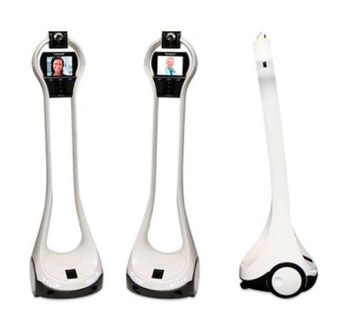Mar 4 2016
Robots in medicine is a readily growing trend in making life easier for patients and doctors alike. Now the St. Louis Children’s Hospital paediatric cancer robots play a role in looking out for the social and psychological needs of patients as well.
 By Jeremy De Zilwa, Tech Advisor
By Jeremy De Zilwa, Tech Advisor
When children are diagnosed with cancer, their hospital rooms often become their new homes. Depending on the severity of their disease, these immunosuppressed patients can be cooped up and isolated for months; missing time with their family and friends, deprived of outdoor activity, and enjoying the fun things normal kids would normally do.
Right outside the hospital is the St Louis Science Center, one of the most kids-friendly museums in the US and visible to most kids at the hospital. However, it’s still a no go for children undergoing chemotherapy. Since the kids can’t physically go to the hospital, Keith Miller, a local computer science professor, came up with a plan to take them there virtually. Miller, whom the kids refer to as Dr. Robot, collaborated with hospital teachers and child-life specialists to allow a VGo robot nicknamed Celia to help hospital-bound children break free and virtually leave their hospital rooms to visit the Science Center.
Prof. Miller is one of several endowed professors at the University of Missouri-St. Louis. He gets money for research and is assigned a partner in the community. His partner is the Science Center. “I try to think of projects that can engage the community through the Science Center,” he said. “My mission as this endowed professor is to get everybody from K to grey interested in science, technology, engineering and math.”
The VGo Robotic Telepresence Device is a robot that is remotely controlled by a person with a laptop using the keyboard or mouse. “So this was one step closer to normalcy for our kids, and it beats doing worksheets any day,” says Linda Casper, an on-site school teacher at the Center.
Ten-year old Amira Evans, who is battling a rare blood and bone marrow cancer, has spent the last three months at the children’s hospital and has a long and aggressive treatment plan ahead of her. She is one of the paediatric cancer patients who has been able to escape her hospital room thanks to Celia. Because Amira is a high-risk patient with acute myelogenous leukemia she will receive two to three cycles of chemotherapy then a bone marrow transplant. Without a healthy immune system to fight off infection, Amira has to stay in a safe and controlled environment. Amira is looking at a very isolated life situation, but Celia changes all of that for the most.
On Amira’s first day out with Celia, her face was projected on the front screen on the robot while she navigated through the museum’s attractions. She made stops at exhibits like the DB Fossil Prep Lab, where she got to look at real dinosaur fossils. Next, she was off to the Pacific Coral Reef aquarium, where she saw exotic fish and learned about reefs and ocean ecology.
Patients not comfortable with their appearance while in the hospital can put a picture of themselves on the VGo screen instead, she explained. Those unable to talk can type, and Celia will speak the words for them. For most kids, the virtual field trips were a success and helped them feel more positive about their treatment. The plan is to get kids visiting more places like the local zoo and the art museum, using Celia.